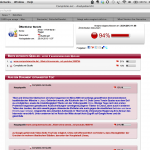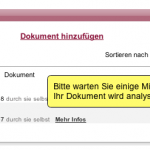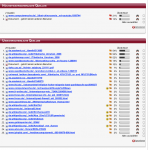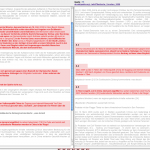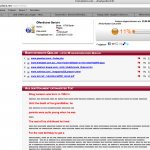Software Profile | Description | Pros & Cons | Report | Usability | Summary | Screenshots | Links
Software Profile
| ID | S13-08 |
| Product | Compilatio |
| Company | Compilatio SAS 276 rue du Mont-Blanc 74540 Saint-Félix- France E-Mail: contact@compilatio.net |
| Web-Site | http://www.compilatio.net |
| Software-Type | Online, with a connector available for Moodle |
| Pricing | No information available |
| Testdate | 25 April 2013 |
Description
Compilatio is offered by the French company Compilatio SAS and has been sold since 2005. Two versions are available. The first, Compilatio Magister, is for teachers in higher education, while Compilatio Studium is marketed to students students. The services are not free, but no price information was available. For this test Compilatio Magister was used. The web page given above has been redesigned since our test and appears to be currently only available in French and Italian, although if we use our logon it still offers German, English, and Spanish.
Pros & Cons
Compilatio was able to identify sources from Google Books, something many other systems were unable to do. It was also able to properly locate the source for the Hebrew test case.
The usability is the major problem for those who do not speak French, as the system will revert to French quite often.
Compilatio saves all reports in its database. Testcases from 2010 were still available, despite the fact that the company had been asked to delete them.
Finding the upload function is not easy, as the menu structure is not intuitive. The system does accept all document types with the exemption of ZIP files. As the user has to agree to the terms of use before a document can be uploaded, uploading multiple documents takes some time.
There was also a grave privacy issue that was discovered during the test. Compilatio allowed its users to share links to their plagiarism reports via social network sites. It is unclear, why someone would want to do so – a report that does not find plagiarism does not mean that a paper is plagiarism free, and if the report does identify plagiarism students probably don’t want that fact posted to their friends. Without having to log in anyone who had the link was able to look at the report. Some reports were also linked as potential sources, so users were able to look at the uploaded documents of other users. And since the reports were numbered sequentially, it was trivial to guess the URLs of other students reports. Since there is also sensitive information included here, although an attempt was made to black out some, not all was treated in this manner. Since this is not acceptable, we informed the company and they removed this option completely a few days later.
Report
Comiplatio offers a side-by.side view, which shows only those fragments marked as plagiarism. Since there is no indication that text has been left out, not looking closely at the report can give the impression that much more of the text is plagiarized that is actually the case. But other than this the reports are well-laid out and are easily understandable. They can also be saved to the users computer.
A few other aspects are confusing: Compilatio divides the calculated scores into „identical similarities“ (in German: wahrscheinliche Ähnlichkeiten) and „assumed similarities“ (German: gleichlautende Ähnlichkeiten). The former contains sources that match word for word, the latter are text portions that have been changed in some way or another. For the scoring in this test only the „identical similarities“ were used.
Compilatio also divided sources into probable and non-problable sources. However, as most of the sources given are documents from other users which are not accessible, they can not be analyzed and therefore are in general not very helpful.
Compilatio additionally allows users to ignore certain sources which are then not included in the overall plagiarism percentage. This is useful for the exclusion of citations.
Usability
There are many options that can be set, however due to the somewhat confusing design and the French explanations that pop up at times it can be quite difficult to use the system. The reports are also offered only on one long page that makes scrolling an issue.
Summary
Compilatio had a severe privacy issue during the test which was quickly resolved. While the system has been improved since the test in 2010, its usability is still problematic and the effectiveness level of 55% make it still only marginally useful for academic purposes.
Screenshots
- Compilatio made our uploaded document available worldwide through a guessable URL
- Processing of a document as seen in Compilatio’s report overview
- Compilatio differentiates between „most probable sources“ and „improbable sources“
- Side by side view in Compilatio that compares the uploaded text with one source
- Compilatio showed a document as source that had been uploaded in the Test 2010

